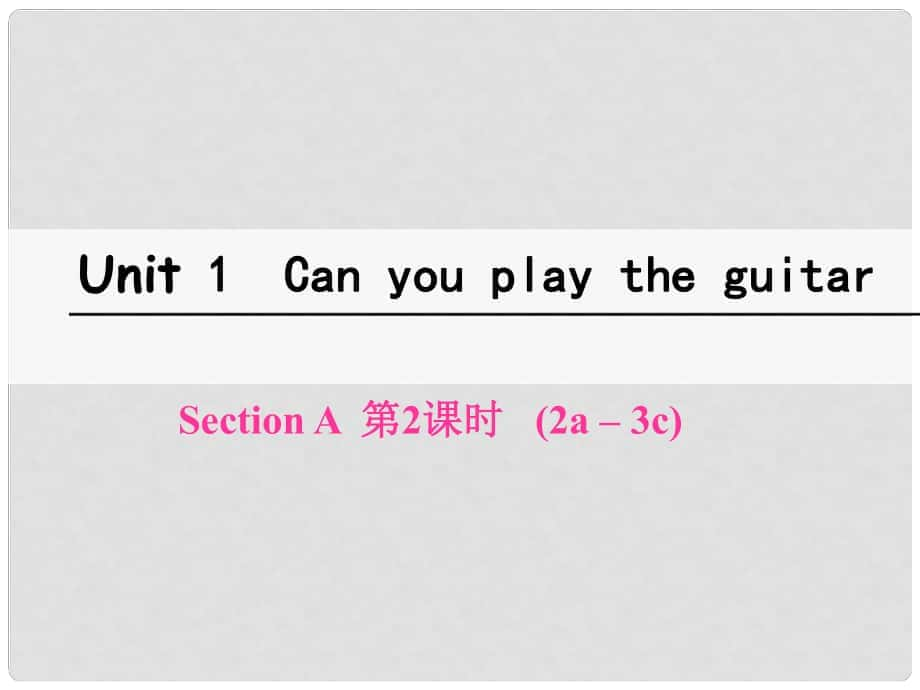《七年級(jí)英語下冊(cè) Unit 1 Can you play the guitar(第2課時(shí))Section A(2a3c)課件 (新版)人教新目標(biāo)版》由會(huì)員分享����,可在線閱讀,更多相關(guān)《七年級(jí)英語下冊(cè) Unit 1 Can you play the guitar(第2課時(shí))Section A(2a3c)課件 (新版)人教新目標(biāo)版(25頁(yè)珍藏版)》請(qǐng)?jiān)谘b配圖網(wǎng)上搜索�����。
1�����、Unit 1 Can you play the guitar 1 Can you play the guitar Section A 第第2課時(shí)課時(shí) (2a 3c)Oh, can you sing?Yes, I can.I want to join the music club.Leading ina. English clubb. art clubc. music clubd. chess clube. swimming clubListen to these two conversations and circle the clubs you hear. 2aListen again. C
2�����、omplete the sentences.1.Lisa wants to join to the_club, but she can not play_.2.Bob wants to join the_ club . He likes to speak _.3.Mary likes music. She can _ and _. Bob likes music,too.They want to join the _club.chesschessEnglishEnglishsingdancemusic2bLook at 2b and talk about what the people can
3�����、 do and the clubs they want to join .She wants to join to theWhat club does Lisa want to join?2cBob likes to He wants to Bob likes , too. He wants to Lisa cant play chess, but she wants to join the chess club.Mary likes She can She wants to Role-play the conversation.Hi,Bob.What club do you want to
4�����、join ?I want to join a sports club.2dGreat��!What sports can you play?SoccerSo you can jointhe soccer club.What about you?Youre very goodat telling stories.You can join thestory telling club.Sounds good.But I like todraw, too.Then join twoclubs, the storytelling club andthe art club!OK, letsjoin now!G
5����、rammar Focuscant = cannotCan you swim?Yes, I can. / No, I cant.Can he play chess?Yes, he can. / No, he cant.Can you and Tom play chess?Yes, we can. / No, we cant.Can Jane and Jill swim?Yes, they can. / No, they cant.What can you do?I can dance. / I cant sing.What club do you want to join?We want to
6、join the chess club.1. swimming����、sound、show的用法的用法(1) v-ing作作定語定語, 如如swimming club游泳俱樂部游泳俱樂部(2) sound是是系動(dòng)詞系動(dòng)詞��,后面要跟形容詞����。,后面要跟形容詞����。 如:如:Thats sounds good.(3)show作作名詞名詞,意味意味“演出,節(jié)目演出�����,節(jié)目”。 如:如:school show 學(xué)校演出學(xué)校演出動(dòng)詞動(dòng)詞�,意為,意為“給給看�����,展示看��,展示”����。如:如:show sb sth./show sth to sb. 給某人看某物給某人看某物 Language points2. What abou
7、t 的用法的用法What about 是是英語口語中常用的省略句英語口語中常用的省略句型型�,后面跟人稱代詞賓格和,后面跟人稱代詞賓格和v-ing�����,常���,常用來征詢用來征詢對(duì)方的看法或意見。對(duì)方的看法或意見�����。如:如: What about the TV play? 那個(gè)電視劇怎么樣?那個(gè)電視劇怎么樣��? What about the playing the violin? (你認(rèn)為)她的小提琴拉的怎么樣�����?(你認(rèn)為)她的小提琴拉的怎么樣����? 3. can的用法:的用法:情態(tài)動(dòng)詞情態(tài)動(dòng)詞can不能單獨(dú)使用不能單獨(dú)使用(簡(jiǎn)單回答除外),(簡(jiǎn)單回答除外)��,后須接動(dòng)詞原形才能表達(dá)完整含義�����。后須接動(dòng)詞原形才能表達(dá)
8���、完整含義���。can一般有一般有兩種含義兩種含義 : (1) 表示能力表示能力,意思是�����,意思是“能;會(huì)能����;會(huì)”。如:如:I can swim.我會(huì)游泳�。我會(huì)游泳。 I can play chess.我會(huì)下棋�。我會(huì)下棋。 (2) 用在主語是第一人稱的疑問句中用在主語是第一人稱的疑問句中��,表示征表示征求意見求意見����,意思是,意思是“可以可以”���。如:如:Can I help you? 我能幫助你嗎�����?我能幫助你嗎? Can I know your name? 我可以知道你的名字嗎�?我可以知道你的名字嗎�?Write questions and answers with the words and phrase
9����、s. 1.Wu Jun / speak English / Chinese_2.Mike / play basketball / play tennis_Can Wu Jun speak English? No,he cant,but he can speak Chinese.Can Mike play basketball? No,he cant,but he can play tennis.3a3.Jane and Jill / dance/ sing_4.Grace / play soccer / play volleyball_5.Bill / write stories / tell
10、 stories_ Can Jane and Jill dance?No, they cant, but they can sing.Can Grace play soccer?No, she cant, but she can play volleyball.Can Bill write stories?No, he cant, but he can tell stories.Complete the following poster with the words in the box. play sing tell dance Students Wanted for School Show
11����、 We want students for the school show. Can you _ or _? Can you _ the guitar? Can you _ stories? Please talk to Mr. Zhang after school. singdanceplaytell3bWhat can your group do in the school show? Make a list. 3cSchool ShowSunday 6:00 p.m.In the music room.What can you do?Come and show us�!What can you do,Li Xin?I can do kung fu.Name What can you doLi Xin do kung fu小結(jié)訓(xùn)練小結(jié)訓(xùn)練1. My brother can _ very well. So he want join the _ club.A. swims; swimming B. swim; swimmingC. swimming; swim2. My brother wants _ the chess club. A. join B. to join C. joins D. join toBB完成當(dāng)堂測(cè)評(píng)作業(yè)完成當(dāng)堂測(cè)評(píng)作業(yè)
 七年級(jí)英語下冊(cè) Unit 1 Can you play the guitar(第2課時(shí))Section A(2a3c)課件 (新版)人教新目標(biāo)版
七年級(jí)英語下冊(cè) Unit 1 Can you play the guitar(第2課時(shí))Section A(2a3c)課件 (新版)人教新目標(biāo)版

